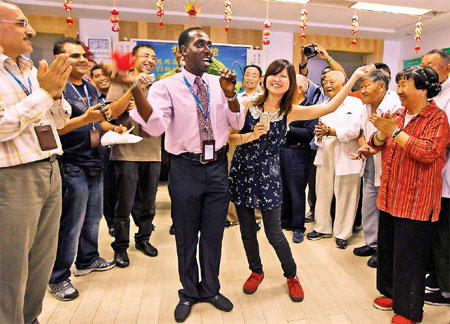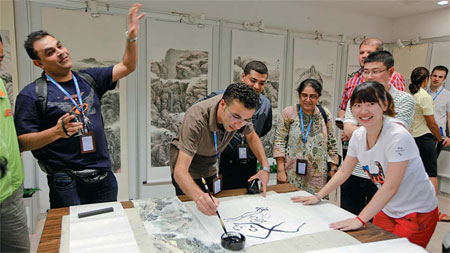Lesson in sharing experiences

| Owren Chesley Smith, from Antigua and Barbuda, sings at a community recreation center in Shanghai in early June. The visit to the center was arranged by the China Executive Leadership Academy Pudong where he attended a course for foreign officials. Gao Erqiang / China Daily |
| Foreign officials attending seminars at the academy experiment with traditional Chinese painting at a community center in Shanghai. Gao Erqiang / China Daily |
Course focusing on developing countries helps address issues raised by foreign participants and allows them to benefit from the knowledge
Is there only one party in China? How are members of the National People's Congress elected? How will China's family planning policy change? These were just a few of the questions raised by foreign officials during a lecture entitled State Structure and the Decision-Making System in China, delivered on June 14 at the China Executive Leadership Academy Pudong in Shanghai. The CELAP lecture was part of a seminar, Infrastructure Planning and Development for Developing Countries, which was attended by 27 participants from 16 countries.
CELAP is no ordinary academy: Founded by the government and supervised by the Organization Department of the Communist Party of China Central Committee, it is one of five national-level institutions to train Party officials.
Apart from training officials in a "global perspective", CELAP has been a leading light in terms of international programs among training institutions for officials.
More than 3,000 officials from 115 countries - about 200 of them at the ministerial level - have attended its courses since the academy opened in 2005.
For officials, the course is required to emphasize the role of Marxism and other political theories.
However, that's not the case for foreigners, says Feng Jun, executive vice-president of the academy.
"There might be a misunderstanding that we are brainwashing foreign officials and asking others to follow our path," he says. "But what we do is to explain our system and share our experiences, not 'instill' anything. We don't deal with ideology."
In addition to the seminars for developing countries as part of the foreign aid program, and including themes such as city planning, development zones and anti-corruption work, there are also projects that mainly recruit officials from developed countries who are interested in the investment outlook in China.
Despite the different theme of each program, the curriculum always starts with an overall introduction to China, including themes such as a General Review of China, The Relations Between Central and Local Government in China, and China's Agricultural and Rural Development, before expanding on the specific topic of each class.
"The basic part is very popular among foreign officials," says Jiang Haishan, who delivers the lecture State Structure and the Decision-Making System in China and is also a vice-president of the academy. He notes that a lot of the participants have limited knowledge about China, and what they do know usually revolves around the country's rapid economic development during the past three decades.
The seminar on infrastructure served as an example. For Oulay Phadouandeth of the Ministry of Public Works and Transport in Laos, the Chinese political system is familiar because "Laos is pretty much the same," he says.
More than half of the participants were visiting China for the first time, and they found the lectures fresh and informative. "I think it is very interesting," says Zulaikha Bai Alimohamed, divisional manager of the Mauritian Road Development Authority. "It is something new to me and it's helpful to learn about the decision-making process because it is related to city planning and infrastructure development."
Fitzroy Williams, chief technical director of the Jamaican Ministry of Transport, Works and Housing, agrees: "My job is technical. However, the really fascinating thing about China is that economic and other developments in China fit within a framework," he says.
"It is the theoretical framework that drives the practice and application of the different experiments and developments. It is clear that for China the political system serves as the engine or the fuel that makes everything happen. It is necessary to set that background for us."
No taboos
A vast number of topics, ranging from China's political reform to religious beliefs, the protection of intellectual property rights to the family planning policy, were popular during the discussions, Jiang says.
Questions such as, "Is China an autocratic state?" and "Is China still a socialist country?" were also asked. "There are really no taboos in the discussions. We don't dodge any issue, be it human rights, democracy or the management of new media," says Jiang.
He notes that while there is only one lecturer for each topic, two or three colleagues are always on hand to take questions from the participants. "We provide them with our view on the topic, but we don't expect everyone to agree with us. But they gain greater understanding after the discussion, more or less," says Jiang.
The lecturers also take the initiative to talk about challenges, such as corruption and the gap between rich and poor.
Whether or not they accept the validity of any given theory, the foreign officials appreciate the open attitude. "I'm satisfied with most of their answers, except the one about Facebook (which is not accessible in China)," says Tomica Paovic, an adviser to the deputy prime minister of Montenegro.
"I learned a lot from China's development. Some ideas, from my experience, I can't accept. But I think they are really sincere and frank," adds Williams. "Sometimes, if they don't have a definite answer, like on the future of the birth-control (family planning) policy, they just come clean," he says. "The fact that a reporter can come to the class and do interviews is also an indication of the open atmosphere."
But it's impossible for the cadre-training academy to be the same as a college where scholarly opinions are more diverse. "We must be politically correct," Jiang says.
As for some highly controversial issues such as border disputes, the lecturers must be more discreet. The principle when dealing with such issues is to "explain the stance, but not to argue". "That's why you won't find any maps on the wall," Jiang explains.
The larger picture
On the morning of June 13, Liu Genfa, who delivers the General Review of China lecture, arrived at the class early and took the initiative to introduce
himself to every participant with a big smile. He also tried his best to greet every participant in their mother tongue, even though the courses are conducted in English.
With seven years' experience of working in China's embassies in Baghdad and the Saudi Arabian capital, Riyadh, Liu said that what counts when communicating with foreigners is not just what you talk about but also the way you deliver your message. "A poker face doesn't work. Plain theory doesn't work. You have to learn to be a storyteller," he said. "Otherwise, Chinese people won't listen, let alone foreigners."
If anything is taboo during the lectures, it is to display arrogance, he said. "We never call it training, instead we say seminars or exchange programs. There is no such relationship as teacher and student, or trainer and trainee. All the foreign officials are called participants," said Liu.
"We are not here to brag about our achievements or set an example to follow. We share our experiences and others can choose the parts that can be applied to their own situation. We also talk about the mistakes China has made so other countries can avoid making the same mistakes in the future."
That approach impressed Boris Mugosa, who advises the deputy prime minister of Montenegro on economic policy and financial systems: "We are here to share, not to agree with everything. That's not the point. Here, we hear many things and learn different approaches. I can't say this approach is better and that approach is worse. I try to understand the positive side of each," he said.
"When people talk about their countries, they always tend to talk about the positive things. But here the lecturers like to talk about problems, such as regional differences, which is also a problem in my country," said Mugosa.
Apart from the on-campus lectures and discussions, the curriculum includes field trips which the CELAP staff members refer to as "living case studies". For example, the 27 participants of the infrastructure seminar visited the site of the Shanghai Expo, an underground shopping mall and a sewage treatment plant. They also spent three days in Qinhuangdao, a third-tier city in Hebei province, and visited some small towns and rural areas.
"We always keep it in mind that Shanghai can't give the whole picture of China. It is a just a part of it, but a very fine part," said Zhu Yuan, an associate professor of urban economics.
"We try to show the different sides of the country. Once, we even went to a mountainous area in Sichuan province. People live a hard life there and that (the visit) left a strong impression on them."
The lecturers also have to avoid using some terms that Chinese people may take for granted, such as "Scientific Outlook on Development", he said. "What does it mean exactly? It's better to explain it in a very simple and clear way. Or it makes no sense to them."
Feel the difference
Cadre training dates back to the founding of the CPC in 1921. The oldest training institution, the Party School of the Central Committee of CPC, has a history of more than 70 years. In the mid-1990s, the Chinese Academy of Governance was established. There are also three leadership academies: in Shanghai, in Jinggangshan in Jiangxi province, in Yan'an in Shaanxi province. They all have a different focus.
The academies in Jinggangshan and Yan'an concentrate on the CPC's "revolutionary tradition" and the current development of the nation.
Because of its location in one of the most developed regions of the country, CELAP's vision is to be "an international, contemporary and innovative leadership academy".
"About 12 percent of our current lecturers are from foreign countries," said Feng.
As there are both Chinese and foreign officials in the academy, he clearly felt the cultural differences between the two groups. "The Chinese officials seldom ask questions. Especially the high-ranking ones, who are reluctant to speak in public for fear of making mistakes. But foreigners are used to critical thinking and never hesitate to raise questions," he said.
In the Chinese program, the speaker at the opening ceremony and the class leader are always selected by the academy. However, it doesn't work that way in the international program. "They may ask 'Why has he or she been chosen?' So we usually let them elect (the class leader and speaker). If we nominate one, we have to give a sound reason," said Zhu Li of CELAP's department of participant service. "Sometimes if I talk too much about a certain country during the discussions, some participants may complain their countries are not treated equally," added Zhu Yuan.
Accommodation is also very important, according to Feng. To make the participants feel at home, the academy not only provides an English-language TV channel in the rooms, but also a channel in the participant's mother tongue. "It is not only the curriculum that matters. The food, the city and the volunteers will all be a part of their impression of China. We have to show friendliness in every possible way," he said.
"Fortunately, cadres training has a long tradition in China and we know how to take good care of people."
tangyue@chinadaily.com.cn
(China Daily 06/29/2012 page24)
Today's Top News
- Xi calls for promoting volunteer spirit to serve national rejuvenation
- Xi chairs CPC meeting to review report on central discipline inspection
- Reunification will only make Taiwan better
- Outline of Xi's thought on strengthening military published
- Targeted action plan to unleash consumption momentum
- Separatist plans of Lai slammed
































